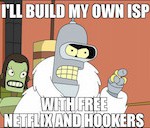Commissioner Chuck Horton was quoted in the October 8 issue of the Oconee Enterprise as stating, “The private sector has chosen not to take this on” while discussing a public-private partnership in Oconee county aimed at enhancing broadband internet access. This is a prime example of a “factual, but not truthful” statement. There is a reason this “choice” was not made. Silence concerning factors that influenced this “choice,” leaves the reader to assume the motivations are either aloof disinterest or the perennial greed charge. It does seem quite odd that businesses normally motivated toward potential monetary gain would simply ignore a wide open market. Why could that be? Maybe, just maybe, it has to do with the never-ending obstacle-course of state and local regulations that impose artificial barriers and costs on potential carriers (see OCGA §46-5-1(a) and 48-5-423).
In dense population centers these barriers may have a smaller impact on the bottom line, however when the population thins out, those fixed costs remain the same while revenues decline. The point at which it does not make economic sense is rapidly approached. But in many cases the economic equation is not even a factor. Monopolization-enabling statutes that limit which carriers are even permitted to enter a particular market can play a much greater role. The carriers are not blameless though. In low population centers they will often petition local governments to exclude competition from their domain. The real problem though is not so much that such appeals are made, but rather that they are even possible to grant legally. Publix can not ask the Board of Commissioners to exclude all other grocery chains from Oconee (no such authority exists (I hope!)) and yet broadband carriers can petition to circumscribe or diminish their own competition. This is entirely due to anachronistic common carrier regulations that grant such authority. When we speak of eliminating regulations, this is what is meant – silent, invisible regulations you are not even aware exist but which impact your life in a meaningful away
But let’s just assume there are zero restrictions and it is simply a matter of profitability. The numbers in the Oct 8 article would seem to bear out why service right now is focused on population centers in the county and not everywhere. It is too rural a county to be profitable if people are not willing to pay the actual costs to obtain service. It is claimed Oconee County will front $4.5 million while Smart City Capital will manage the project. It is then stated that it’s “possible” Oconee will earn back its investment. Possible. Would you invest your retirement savings into a bond that might yield you a 0% return after 20 years? It’s not unsurprising then that any company or person would not want to risk their own funds in such a high-risk low-reward venture if these numbers are indicative of the profit potential. So how do we overcome the natural reticence to make such an investment? Well, we just take the money from people (through sales tax). If you have to fund something through taxation then that is a strong indicator you are engaging in economically destructive activity. Absent a taxation backstop, such projects lose money, that is, they take something of higher value and reduce it to something of lower value.
If the citizens of this county wish to bring this project to fruition as outlined in the article then they should be willing to risk their own money by voluntarily buying into this venture. In other words, shareholders, not taxpayers. If this is truly a “good idea” then what is the risk? I know that using other people’s money (taxes) to fund something that disproportionately benefits you is the norm these days – but that doesn’t make it right. Principles over pragmatism







